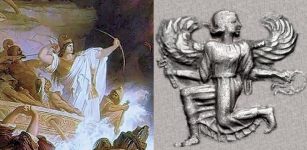On This Day In History: The Battle Of Benevento Was Fought – On February 26, 1266
AncientPages.com - On February 26, 1266, the battle was fought near Benevento (in present-day Southern Italy).
The troops of Charles of Anjou and Manfred of Sicily were involved in the conflict. Manfred's defeat and death ended the rule of the House of Staufen (of Hohenstaufen), a dynasty of German kings (1138–1254) in the Italian Peninsula.
 Battle of Benevento, from Giovanni Villani's Nuova Cronica. Public Domain
Battle of Benevento, from Giovanni Villani's Nuova Cronica. Public Domain
The Papacy had long been in conflict with the imperial house of Hohenstaufen over their rule in Italy. At the time of the battle, the Hohenstaufen ruler in the Kingdom of Sicily (which included Sicily and southern Italy) was Manfred, an illegitimate son of Frederick II, Holy Roman Emperor.
While the rightful heir to the Kingdom was Frederick's legitimate grandson Conradin, he was young and safely across the Alps in Bavaria. Taking advantage of a false rumor of Conradin's death, Manfred took the throne in 1258.
In 1263, Pope Urban IV decided to wrench the Kingdom from him by concluding a secret treaty with Charles of Anjou, promising him the Sicilian throne.
Charles of Anjou reached Rome in 1265, but it took some time before his military encounter with Manfred's forces occurred. Charles had divided his cavalry into three "battles."
The infantry and the first battle, consisting of 900 Provençals, were at the front. Behind them was the second battle by Charles of Anjou, which consisted of 400 Italians and 1,000 men of Languedoc and central France. The third battle consisted of about 700 men.
Manfred's Saracen archers were in the fore; behind them was the first battle, 1,200 German mercenaries armed in coats of plates; the second battle consisted of the Italian mercenaries, about 1,000, and 300 Saracen light horses, and the third battle, numbered 1,400 men.
As the French infantry advanced, he unleashed his Saracen archers and light cavalry, scattered the French. But the Saracens left themselves exposed to the French heavy cavalry and were, in turn, overwhelmed. Manfred ordered his heavy cavalry, mostly German mercenaries, into the attack to regain the advantage. Initially, they seemed to succeed, but they were seriously outnumbered and began to take heavy losses.
The role played by Manfred's Italian cavalry is still disputed: either they attempted a flanking attack and were quickly beaten, or they were so shocked to see the butchered German soldiers that they fled the field without a fight.
The destruction of Manfred's army marked the collapse of Hohenstaufen's rule in Italy.
AncientPages.com
Expand for references



















